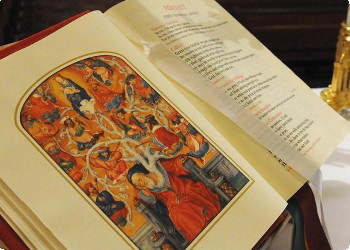For he loves our nation
1 Tm 2,1-8; Ps 27; Lk 7,1-10
16 SEPTEMBER
In Scripture the first man who prayed to the Lord, putting forward the reasons for his request, is Abraham. God cannot say a Word that then he does not keep. But neither can he act in a way that is different from his nature. If He says, being Omnipotent, He can and must keep the Word. If He acts in history, he must always act with justice.
Sometime after these events, this word of the Lord came to Abram in a vision: “Fear not, Abram! I am your shield; I will make your reward very great.” But Abram said, “O Lord God, what good will your gifts be, if I keep on being childless and have as my heir the steward of my house, Eliezer?” Abram continued, “See, you have given me no offspring, and so one of my servants will be my heir.” Then the word of the Lord came to him: “No, that one shall not be your heir; your own issue shall be your heir.” He took him outside and said: “Look up at the sky and count the stars, if you can. Just so,” he added, “shall your descendants be.” Abram put his faith in the Lord, who credited it to him as an act of righteousness (Gen 15,1-6).
Then Abraham drew nearer to him and said: “Will you sweep away the innocent with the guilty? Suppose there were fifty innocent people in the city; would you wipe out the place, rather than spare it for the sake of the fifty innocent people within it? Far be it from you to do such a thing, to make the innocent die with the guilty, so that the innocent and the guilty would be treated alike! Should not the judge of all the world act with justice?” The Lord replied, “If I find fifty innocent people in the city of Sodom, I will spare the whole place for their sake.” Abraham spoke up again: “See how I am presuming to speak to my Lord, though I am but dust and ashes! What if there are five less than fifty innocent people? Will you destroy the whole city because of those five?” “I will not destroy it,” he answered, “if I find forty-five there.” But Abraham persisted, saying, “What if only forty are found there?” He replied, “I will forebear doing it for the sake of the forty.” Then he said, “Let not my Lord grow impatient if I go on. What if only thirty are found there?” He replied, “I will forebear doing it if I can find but thirty there.” Still he went on, “Since I have thus dared to speak to my Lord, what if there are no more than twenty?” “I will not destroy it,” he answered, “for the sake of the twenty.” But he still persisted: “Please, let not my Lord grow angry if I speak up this last time. What if there are at least ten there?” “For the sake of those ten,” he replied, “I will not destroy it” (Gen 18,23-32).
Giving motivations to God is appealing to the truth of his nature, against which he might never act. Never might God work without justice and never might he not keep the given Word. The same is true for Jesus. Giving him motivations is obliging him to perform the miracle, because even he might never act against his nature and against his Gospel. If he has promised who loves that an overflowing measure will be poured into his womb, might he ever deny the miracle to a man who loves the Jews and has also built them the synagogue? Jesus must love this man. He must do the miracle to him. He cannot but listen to his prayer. If he did not listen to it, he would be a bad Master instantly. He teaches true love and then it is He who does not love.
When he had finished all his words to the people, he entered Capernaum. A centurion there had a slave who was ill and about to die, and he was valuable to him. When he heard about Jesus, he sent elders of the Jews to him, asking him to come and save the life of his slave. They approached Jesus and strongly urged him to come, saying, “He deserves to have you do this for him, for he loves our nation and he built the synagogue for us.” And Jesus went with them, but when he was only a short distance from the house, the centurion sent friends to tell him, “Lord, do not trouble yourself, for I am not worthy to have you enter under my roof. Therefore, I did not consider myself worthy to come to you; but say the word and let my servant be healed. For I too am a person subject to authority, with soldiers subject to me. And I say to one, ‘Go,’ and he goes; and to another, ‘Come here,’ and he comes; and to my slave, ‘Do this,’ and he does it.” When Jesus heard this he was amazed at him and, turning, said to the crowd following him, “I tell you, not even in Israel have I found such faith.” When the messengers returned to the house, they found the slave in good health.
The centurion reveals the truth of Christ Jesus. He is a person from the Word that can command every existing being of creation. The command does not require his presence. He commands and everything happens. Jesus is extremely high. He is very small.
Mother of God, Angels and Saints arrange that we always confess the very pure truth of Jesus.





